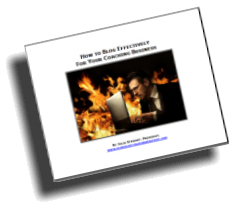
Yesterday, I got an odd email from the International Association of Coaching (IAC) President, Bob Tschannen-Moran.
Maybe I misunderstood, but it seemed to me that Bob was trying to tell me that a recording that I made with Natalie Tucker Miller and Elizabeth Nofziger, who are both IAC & SCM Certifiers, and using systems that belong to my company, actually belongs to the IAC to do as it sees fit, regardless of my wishes. Hmm...I think U.S. Copyright and Freedom of Speech laws would differ with that.
[Update: I just received a note from Bob, saying of course the recording is mine. I did indeed misunderstand. This post isn't an attack on Bob or the IAC Boards. I just disagree - or misunderstand. You're invited to add your thoughts in the comments section, below.]
If you know me well, you're probably chuckling, because I'm somewhat famous for my temper. It’s my worst weakness. On the up side, I always learn something valuable when I get mad. Here's what I'm learning from my latest tempest:
My loyalty actually lies more with Thomas Leonard's International Association of Certified Coaches (See the original logo above) than it does with the current IAC. Today's IAC is the organization that evolved from that over the past seven years and of course, it is different. The problem for me is that I'm not okay with all of the differences.
If you’re curious, check out Thomas Leonard's original announcement about the IACC here. Is it better or worse? That's a matter of opinion, but here are some of my thoughts:
Thomas' vision for improving the quality of coaching worldwide was huge. He saw a skills-based coach certification as the vehicle to bring about this worldwide upgrade to coaching excellence and the IACC was the organization to oversee it. It could only be accomplished if large numbers (most?) of coaches got on board. With a big mailing list of devoted followers and a willingness to put up $25,000 seed money, Thomas had the tools to make it work.
Given Thomas' tragic death less than five months after he announced the IACC, it is a triumph that it survived at all. His estate was tied up for over a year. His company changed hands and took a different path. However, the IACC already had thousands of passionate supporters. Many of whom, like me, were donating their time to make it happen. Still, it was a disturbing sign that his vision was already being watered down, when not long after Thomas' passing, the International Association of Certified Coaches' name was changed. It's now the International Association of Coaching.
What about the commitment to Certified Coaches? Read on.
The IAC retained the Certified Coach brand. Although it no longer uses the Proficiencies, it still certifies coaches using a process similar to the one Thomas and the original IACC President, Michael 'Coop' Cooper, laid out. It is a very rigorous certification process that only about 25% of coaches pass on the first try. It does indeed raise the quality of coaching for many who attempt it.
However, the IACC's sister organization, the Coaching School Accreditation Council, announced at the same time by Thomas, doesn't exist. This organization would decide if a school could teach the intellectual property on which the Certified Coach designation is based and thereby prepare coaches to get certified.
Is there an IAC coaching school accreditation process? No. Rather than a coaching school accreditation as rigorous its coach certification, the IAC has chosen instead to make its IAC Coaching Masteries(TM) available to anyone via a commercial license. It doesn't matter if you're a coach, a dentist, a plumber or a marine biologist, if you want to be an IAC Licensee and teach the Masteries, all you have to do is pay the IAC some money. What?
The IAC doesn't even require its licensees to be IAC Certified Coaches. Funny, they have one of the world's most rigorous coach certifications, but apparently anybody with a credit card is qualified to train coaches to prepare for it. Where is the consistency of purpose?
Worse, the IAC website doesn't clearly communicate this to visitors. Most people (in the U.S. anyway) assume that a license means some kind of test has been taken. If you want a license to practice medicine, you have to pass a test. If you want a license to drive, you have to pass a test, etc., etc. But if you want a license to teach the IAC Coaching Masteries(TM) all you need is some money. Good for the IAC, not so good for coaching.
A commercial license is the type you agree to if you want to use software by Microsoft or Apple. It's a bunch of legalese you must accept in order to use their intellectual property. It doesn't imply approval, it simply protects the organization that does the licensing.
The IAC license protects the IAC from risk, but it offers no leadership to the coaching world, not the sort that the IACC was founded upon. An organization can't lead without taking risks.
Although I'm really not okay with the IAC's commercial license, I was the first to buy one. Why? I still believe in this certification. I'm just disappointed that so little attention has been paid to HOW coaches will upgrade their coaching by seeking IAC Coach Certification. The IAC says it is not in their mandate to teach or accredit. But this is an important need and leaving it unaddressed leaves a big crack in the process. The result is that only a fraction of Certified Coaches exist compared to the original intent.
Numerous coaches have told me privately that they think the commercial license is a big mistake. However, the membership has virtually no way to fight it. Because although the original IACC granted voting rights to all Certified Coaches, the current Board of Governors (BOG) and Board of Certifying Examiners choose their own replacements, not the members. This means they can change the rules without even notifying us.
Don't get me wrong, many Board members are my close friends and colleagues. There are some dedicated people there working hard on the IAC and I think their intentions are good. But if you want to get on the BOG, you have to be recommended by a current BOG member and then voted on by the other BOG members. That can block certain people from ever being able to serve.
The current voting structure leaves the BOG unaccountable to anyone. It's easy for a comfortable 'group think' to set in and for board members to agree on rules that work for them, but not for the whole membership. If the IAC were to become the huge worldwide organization that Thomas envisioned, a small group of people and their friends would have too much power over this fast-growing billion-dollar industry.
Even though I've been invited to join both Boards, I'm not comfortable with the current process. I think IAC members should be making these choices, themselves. Give them the vote! Members of an organization who have voting rights tend to be more engaged and invested in it. Because there’s a disconnect between the board, the members and the mission, many of the original supporters have fallen away.
Is it fair for me to expect today's IAC to act like the original IACC? Probably not. But some elements that I think are critical to its mission, the mission that I still care about, have been lost over the years and that makes a big difference, at least to me.
That leaves me wondering whether School of Coaching Mastery's IAC license is still a fit for us. Without it, I'd have greater freedom in developing my own intellectual property and there wouldn't be disagreements over who owns my recordings.
Don't worry, if you're an SCM student, we're not going to make any changes right away and regardless, we'll keep our agreements. Even if we drop the license, we can still help you get certified. I've been helping coaches pass IAC Coach Certification since 2003 and the past two years since we first bought the IAC license (It wasn't available until then) haven't helped us do that any better.
What do you think? Should the IAC's Board be voted on by the IAC Membership? Should the IAC continue to license any and all comers? Is there any reason to stay faithful to the original IACC mission? Should members have more power? Or should we just quietly go on paying our dues?
By the way, if you're curious about the recording in question, it's available for free to members of the IAC North American Virtual Chapter, a free service for all coaches that we offer and that is aligned with the IAC.

Join the IAC North American Virtual Chapter for free here.
 The Best Coaching Blogs 2010 Contest Winners Include the Awesome Business and Life Coaches Below:
The Best Coaching Blogs 2010 Contest Winners Include the Awesome Business and Life Coaches Below:














